WEEKEND SPECIAL: Captain America: Brave New World/Paddington In Peru
Couple Of New Movies About Ex-Cons!
Anyone who has read this Substack for a while knows that I have certain thoughts on comic book movies. As such, I went into “Captain America: Brave New World” knowing the long and illustrious existence of Sam Wilson. Canonically, he’s the first African American superhero, debuting at the Falcon in 1969, though he’s spent a lot of that time primarily as a sidekick of sorts. It’s only recently when he became Captain America in the comics — in fact, it was 2015, when I was in prison. This did not strike me as particularly notable, given that he assumed the mantle after several others in the comics, including John Walker (U.S. Agent) and Bucky Barnes. I’m not certain if Steve Rogers, the original Cap, was dead when Wilson assumed the mantle. But I am certain that if he died, he got better — no one, not even Steve Rogers, stays in the ground in the Marvel Universe.
Obviously, the movies can’t replicate the comics, people age and retire and move on. At first, the Marvel Cinematic Universe was an excuse for whiz-bang pyrotechnics and theatrics across a massive canvas. But now, it’s become a recognizable place. Casual fans can now name the places only hardcore nerds once understood — Wakanda, Knowhere, Madripoor. “The Falcon And The Winter Soldier”, which introduced us to the concept of Wilson as the new and only Captain America, addressed issues such as what happened to the rest of the world when the population dwindled after Thanos’ attack, as well as the concept of how and if the Avengers actually get paid.
Now, these movies have to do two things. They have to placate the hardcore fans (which can always go back and read the comics, where there is not just one but several Captains America), but they also have to establish that the MCU is a place with real stakes and implications, a world that changes around its citizens, a world that can be difficult to occupy for some, and easier for others. I can tell you that “Captain America: Brave New World” does not in any way do the former. On my list of MCU battles from the comics I always wanted to see, Captain America OR Falcon versus Red Hulk was not there. The same could be said of villain The Leader, who confusingly refers to himself here as “The Hero” at one point.
Which is in itself maddening, because who is The Leader? It’s Samuel Sterns, played by Tim Blake Nelson and last seen in 2008’s “The Incredible Hulk”. That movie had changed the canonically cognitively-challenged janitor into a friendly scientist. Not a bad alteration, and it allowed Nelson to get on set with Edward Norton and pitch their next collaboration, the delightful “Leaves Of Grass”. But the Sterns here, mutated by gamma radiation into becoming a mad genius, is enacting revenge as he’s bitter that then-General Ross (once William Hurt) blamed him for the mutation of Emil Blonsky (Tim Roth) into the Abomination, leading to a brawl that destroyed Harlem. We can surmise from the Marvel Netflix shows that Harlem has endured, but in that movie you are seeing hundreds of millions of dollars of damage done to a culturally-significant section of New York City. Supposedly, Sterns has been radicalized because he technically committed no crime and was forced at gunpoint to administer radiation to Blonsky, before being cruelly subjected to how own treatment. A raw deal. But prison among others is what changes you. Prison in isolation preserves who you were. As such, there is no commonalities between Sterns in 2008 and the big-brained Leader in this film, who thus has a fairly secondhand plan to brainwash a number of rogue soldiers to do his bidding. Supposedly, the Leader did not spend his time in prison watching the crappy blockbusters from which he’s stealing.
Ross too is a different man, figuratively and literally. Hurt played the character, across a handful of movies, as a cerebral, stiff voice of authority, rising from General to Secretary of State. As the architect of the once-pivotal Sokovia Accords, he reshaped the superhero landscape. Now played by Harrison Ford in the wake of Hurt’s passing, Ross is a fiery eighty-something President, retconned into having rage issues stemming from what we see is a televised press conference in the wake of Harlem’s destruction. Shades of Donald Trump’s Charlottesville press conference which right wingers are currently also trying to retcon into making it seem Donald Trump is not a Nazi sympathizer. Nevertheless, in the outburst seen in the footage, it’s clear Ford’s Ross is a different person than Hurt’s, more pragmatic, more pugilist.
There is a way into “Captain America: Brave New World”, and it’s through Ross. Despite the fact this is an entirely different version of a guy we’ve met over the course of several movies (including, notably, as Sam Elliot in 2003’s “Hulk”), he is a tragic figure. Ford is giving his first genuine cinematic performance in a long while as a man who has compromised his own health in a manner that has granted power to his enemies (shades of Joe Biden too!). Ross ends up involving America in an international mishigoss involving adamantium (if you know, you know), and it’s less about his own warring tendencies and more about a seamless diplomatic exchange that will, in some way, please his estranged daughter Betty (herself unseen in a Marvel movie since 2008). He’s engaging with death, as anyone his age would (he throws a full-bodied punch in this movie that would give anyone aware of the limitations of the human body a heart palpitation), and he doesn't like the face he’s seeing in the mirror.
He’s also, of course, an irascible old racist. When there is an assassination attempt against him in the first act by a Black ex-con (Isaiah Bradley, played by Carl Lumbly — more on him in a bit), we know it’s a fishy story because it’s out of character for Bradley. But when Wilson attempts to investigate, Ross shuts it down on account of the “optics” — it’s unspoken that it’s a Black man investigating his Black friend in the shooting of a white President, without oversight. Ross hammers this home by calling Wilson “son”, which doesn’t hit as hard as it should since Ford has been calling people “son” onscreen for about forty years, but it’s still notable. Ross, with or without Ford’s powerful performance (mostly with), is a compelling character in this narrative.
The other way in is through Bradley. We met Bradley in the “Falcon And The Winter Solder” TV series, a slowly-aging World War II veteran who was given the famed Super Soldier Serum before Steve Rogers. Bradley had since been imprisoned for thirty years, largely as a ploy by the government to avoid answering questions about the enhancement of a Black man for the purposes of government advancement. The steroid created to celebrate the white man (Rogers) and hide and imprison the Black man (Bradley). It’s part of the reason why Wilson, unlike his predecessor, did not accept the serum, which was thusly used on both John Walker and Bucky Barnes, both Caucasian Americans.
While still superpowered, Bradley exists largely in the shadows. He calls Wilson a friend, but does not approve of the new Captain America answering to the President. Lumbly, actually the first African American superhero in television history (as the star of 1995’s Sam Raimi-produced “M.A.N.T.I.S.”). Lumbly plays this character with as much bottled Black rage as you’ve ever seen in a mainstream film — it seems like the phrase “Uncle Tom” is just teetering off his pursed lips, ready to be hurled at the costumed Wilson. He succumbs to the mind-control of The Leader (the specifics of which are probably found in a deleted scene we’ll never get to watch), and takes up arms against the President, and misses. He is savagely attacked and brought to the ground, in the way January 6th perpetrators would have been if they too were Black, and quickly hustled off to prison.
Bradley explains this to Wilson as if he knows he did not commit the crime. And yet, his shoulders slump, and he prepares for another eternity behind bars. I understood this mentality clearly. The character had spent decades in prison for a crime he did not commit, a scapegoat for the government. Whereas Samuel Sterns turned this into an outrageous injustice, Bradley understand that this is how the government wants to treat him forever — an animal waiting to be employed for his skills and then jailed hereafter. He is not interested in clearing his name, and instead ready to surrender to a system that frequently crushes him. Amusingly, and tellingly, he puts his foot down on the issue of solitary confinement. He also painfully tells Wilson to stop visiting him in prison. Like Ross, he is concerned with the optics. Wilson is trying to march forward as a new type of American hero, but Bradley understands the American government will never accept and celebrate powerful Black men.
You wish this gave more for Anthony Mackie to play, since this is ostensibly his movie. Instead, this very much reminds of “X-Men: The Last Stand”. In that fractured, sloppy narrative, it’s Magneto who takes up arms against a government that is weaponizing science against the mutant race to de-legitimize and exterminate them. Like Bradley, he understands the disasters of World War II firsthand. Meanwhile, the X-Men are the ones making a last stand, but for what? They end up protecting the government from the violence of Magneto’s Brotherhood Of Mutants, preserving the status quo and even using the government’s weapon against the terroristic villain. At the movie’s close, we’re supposed to cheer when Beast takes a White House position within the government that tried to attack, forcefully immunize and imprison him. Shockingly, that prompt comes from Wolverine, famously a victim of ruthless government experimentation. It is a movie made by idiots.
As such, Wilson’s Captain America, a minimal side character in various movies, has very little narrative drive. He mostly shows up, fights people, and then lets someone explain the mundane plot to him. It’s a mystery in that Sam Wilson doesn’t know something until a character walks up and tells him, and then he acts accordingly. It’s a humiliating part for an actor who has been in several movies and even his own show. I found it amusing when he seemed to allow villain Sidewinder (Giancarlo Esposito, having fun with material beneath him) to dictate that he would be sentenced to FCI Allenwood for his crimes, a famously-cushy medium security federal institution from where he already announces his coming breakout. He also demands his own cell immediately — you wonder how that one’s going to go over on the yard.
We spend less time with the better characters in the movie, and more time with Wilson and his excruciating sidekick, Joaquin Torres (Danny Ramirez). There was excitement that Torres, as the new Falcon, would be the first Latino Avenger. But this guy, forgettably introduced in the aforementioned television series, is meant to be the quippy, plucky counterpoint to Sam Wilson, except that he isn’t funny and has no point of view. He’s a throwback to the uselessness of early comic book sidekicks — he doesn’t sound all that different from the original boy-aged Bucky Barnes. You know the writers are not treating him as a serious character when he expressed his desire to meet Ant-Man, of all the Avengers. Which is fine, if he’s not serious. But make him funny. Or at least have him actually meet Ant-Man in your suspiciously Avenger-free movie.
Most pointedly, Torres and Mackie take flight together, which is a misunderstanding of action movie dynamics. Sam Wilson as the Falcon becoming Captain America has always had an air of hat-on-a-hat, since he retained the Falcon wings but cumbersomely kept the shield. There’s just too much going on visually and thematically, and that’s without acknowledging that his wings were made of Vibranium and provided by the (offscreen) Wakandans. Outside of the shield, these two soldiers aren’t differentiated enough, so when the new Falcon screws up, it’s because he’s clearly not as good as doing what our main hero does. That diminishes his already minimal impact on the story and themes — there is a telling and dubious third act mishap that sidelines him for the finale, because two heroes flying in the same manner in an action climax was a challenge that clearly flummoxed the creatives in this film (which, if you believe the stories, includes several uncredited directors, writers and editors).
All of this is a long way of saying that the movie does not placate the fans, nor does it read to the average non-Marvel filmgoer. So that leaves the other challenge — does this movie occur in a recognizable world that matters? This problem isn’t solved by a number of issues outside of the purview of the filmmakers, though they were avoidable. Consider this — Marvel has a difficult timeline in regards to its Presidents. The Netflix shows, with their dubious canonicity, speculated on both Donald Trump and Barack Obama, to the point where you could suggest the “blip” that occurs in 2018’s “Avengers: Infinity War” happened during a Trump administration. This timeline notion is upset by the idea that President Matthew Ellis (played by William Sadler in “Iron Man 3”) was somehow sandwiched between those two Presidents, and according to “Agents Of SHIELD”, may have served two terms.
Which, yes, wonky nerd stuff, you could probably ignore all that. However, the last time we saw a Marvel-world President was President James Ritson, played by Dermot Mulroney in “Secret Invasion”. Not notable on its face, except that he is the President on that show in 2025. At the end of that series, he is seen declaring that the American government will wage war against the shape-shifting Skrulls. Not only is this a legislative decision, it also acts to stir up hate against American citizens, all of whom could conceivably be Skrulls. The final moments of “Secret Invasion” suggest a fever dream embrace of conspiracy theories among Americans. In that show, Samuel L. Jackson has an on-the-nose line about how Ritson’s decision will cost him re-election. So when is this re-election? 2028? Or perhaps there was an election in 2026, and history is simply in a different timeframe within the MCU?
Look, this is all lost-in-Reddit brain rot. However, there is no mention of the Skrulls or the conspiratorial ideas of a previous administration when Ross wins election at this movie’s start. So what does Ross run on? Is he a Democrat or Republican? Does he think about taxes or national security, or maybe even transgender issues? Probably not, right? We don’t need a breakdown of the President Ross platform. But who is in his cabinet? We’re thirty something movies deep into a complex cinematic universe with various accompanying shows. We probably know who could show up in this Presidency. Does he even have a Vice President? Every meeting that the President has is with some variation of Captain America and his lead Secret Service agent, the diminutive but dangerous Ruth Bat-Seraph (Shira Haas), a veteran of the brainwashing red rooms in Russia, and originally trained in Israel, which… woof, that’s a lot!
When Matthew Ellis showed up in “Iron Man 3”, in a supporting role, you didn’t need to say a lot about him. But forty-plus movies and TV shows through the Marvel world, when the President is one lead character in an ostensible political movie, you have to ask, who is this person? Who surrounds him? What does a Marvel presidency look like? You have to make us aware of what politics and ideologies we’re rooting for and rooting against. This is Captain America — which America is he protecting? The question should foster guilt and complication within him. Instead, Mackie marches through this film like a blunt instrument. The journey through his relationship with President Ross is “kind of a jerk” to “Okay, I understand him” to “OBVIOUS VILLAIN, NVM.” Hardly compelling stuff.
And does anyone have any thoughts on this Celestial? Ross leads America into a contentious conflict with other countries (notably not China!) over the adamatium found within the body of a Celestial, a massive robot-like creature, ostensibly dead, frozen in the ocean, maybe a quarter of his full form having emerged from the Earth. This being was explained in the messy “Eternals”, but to the audience and those particular characters, not to anyone else, and not to a government. There is talk of these countries building scientific labs close to what is now called Celestial Island. But this… thing looks like a living creature. Are they confident this thing is dead? Does anyone want to ask why this exists? And could it cause more harm? Is anyone troubled by the theological questions surrounding a planet-sized humanoid creature not only trying, but failing, to emerge from the Earth? It’s like the writers watched the theologically-complex “Eternals”, saw the massive Tiamut emerging from the world and thought, “Oh, look, that’s our architecture.”
This lack of world-building isn’t necessarily a dealbreaker, except this this film is subtitled “Brave New World”. So what is the Brave New World? Is that what’s happening at the beginning of the film that is slowly walked back? Is it the new status quo at the film’s end? Considering these movies are always bleeding into each other (and this one ends with the credit bloc “Captain America Will Return”), there’s no clues as to what the world is like after a climactic battle that has been prominently featured in the ad campaign. The Leader gets to whisper some post-credits crap about “worlds” that, once again, reeks of “we haven’t written anything yet for these upcoming movies, but they’re happening.” Except by mentioning a “world” we’re left wondering, okay, we’ve been here for two hours. What is this world you speak of? How is it brave? Is it new? Because if we don’t know, well, there’s a different world one theater over, and we’re walking to that one.
That other theater might be showing “Paddington In Peru”, by the way. Not much to say about part three, although my boy Paddington has lost a little off his fastball. This is a boy-centric jungle adventure film that dabbles in issues of cultural identity and legacies, in both Paddington’s childhood as well as the lineage of adventurers from which Antonio Banderas’ Cabot descends. Banderas gives it his all, but his antagonist is not as compelling as Phoenix Buchanan from part two or Millicent in part one. And Olivia Colman and Emily Mortimer are here to bring great cheer, but they’re no replacement from the sunny Sally Hawkins, who sat this affair out.
The plot questions involving Paddington’s lineage hew a bit too close to the “don’t you want to know about his parents?” queries of the Andrew Garfield “Spider-Man” films. Though I was surprised to see there wasn’t much weight granted to Paddington’s past as an ex-con, bunking up with Knuckles McGinty in part two. This film does feature a brief sojourn to visit an old friend behind bars, however, a reminder that Paddington understands that everyone can be redeemed. Paddington embraces a decarceral spirit even greater than mine, and for that, I am thrilled he keeps the flame alive. End incarceration, because if you’re nice and polite, the world will be right. Again, Paddington and I aren’t necessarily on the same page, but I like the cut of his jib.
Happy Sunday! Enjoy the full movie of the original “Captain America”!
And “M.A.N.T.I.S.”!

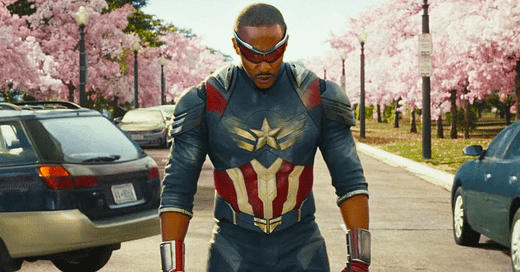




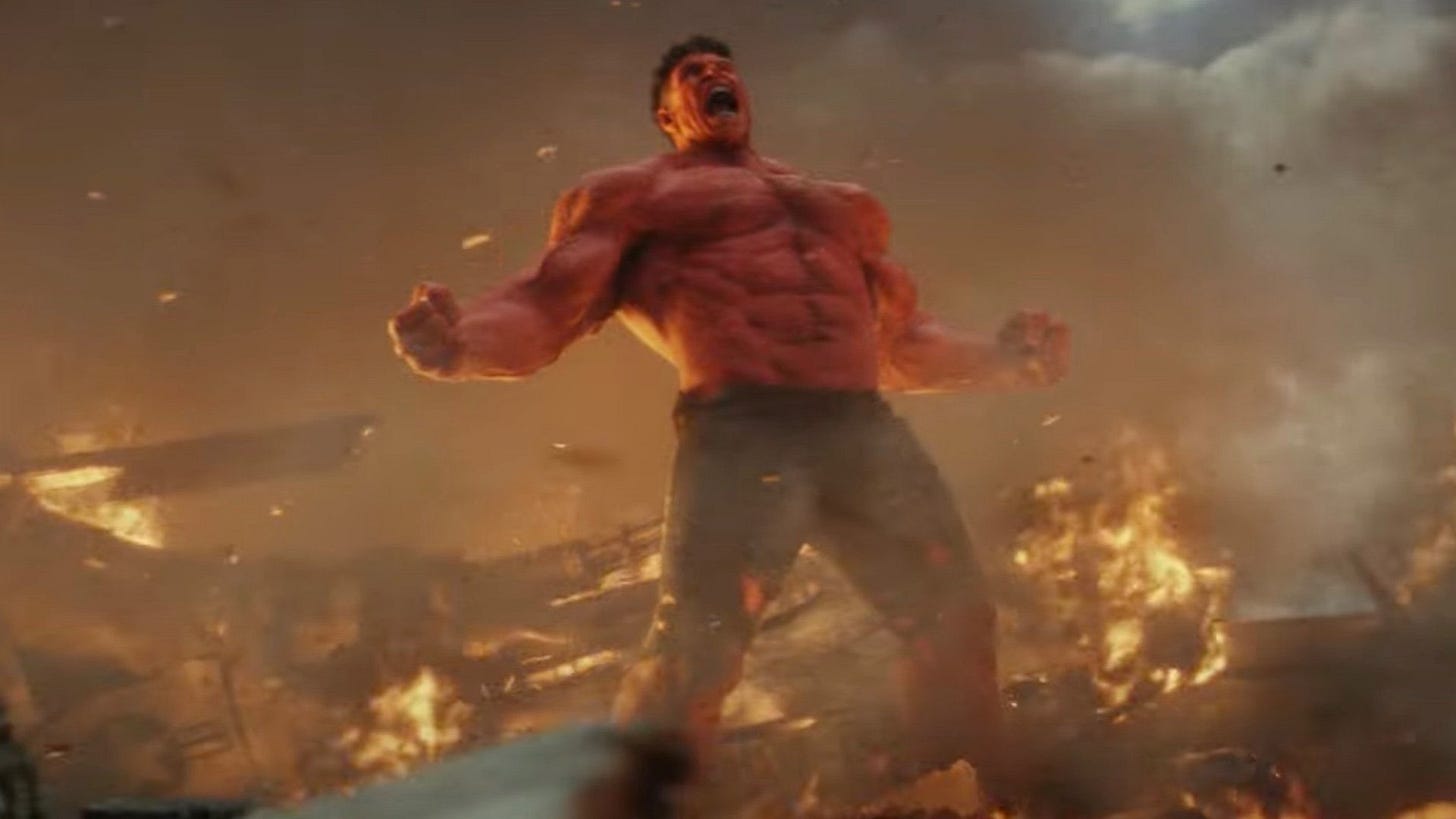

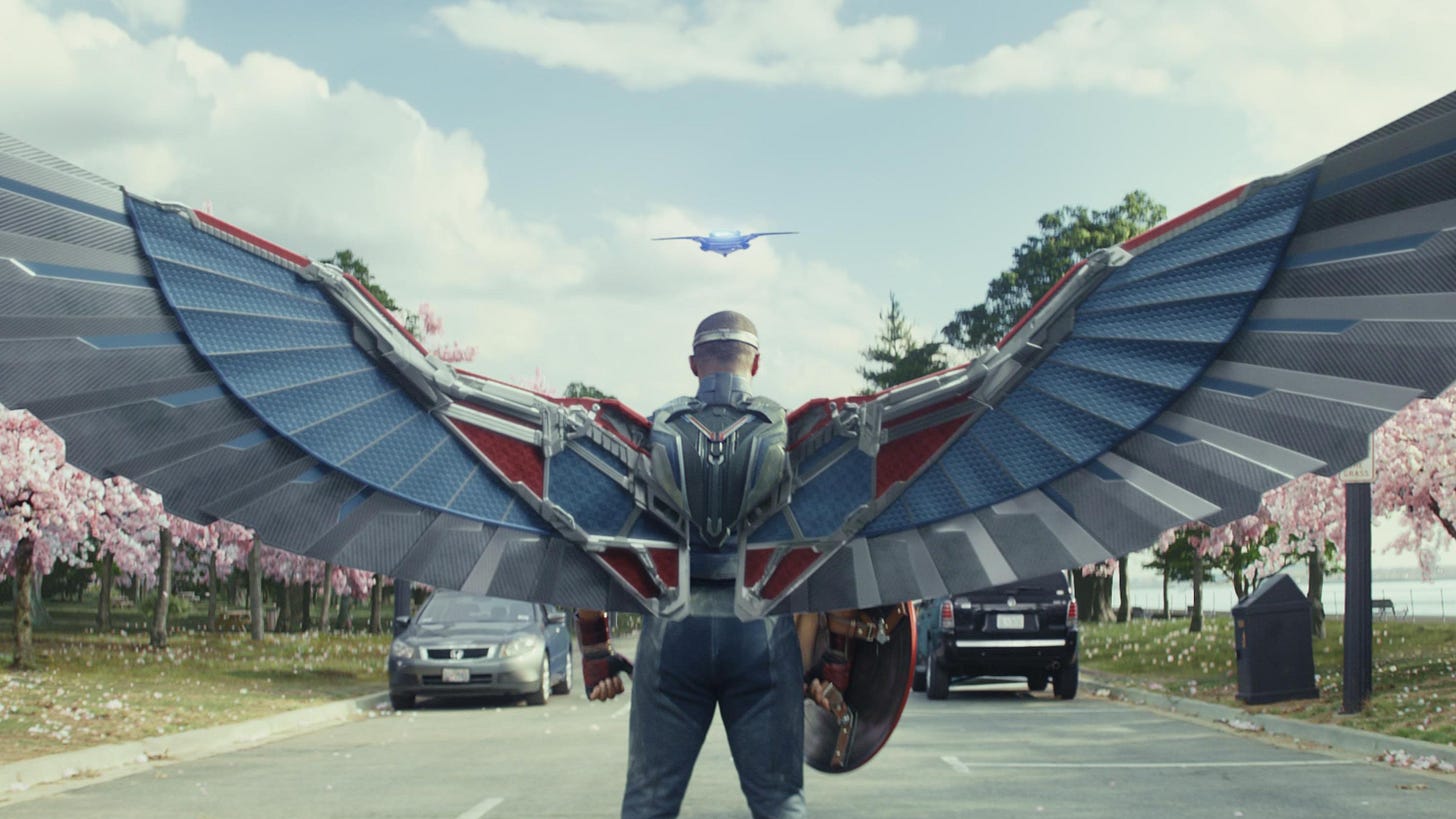
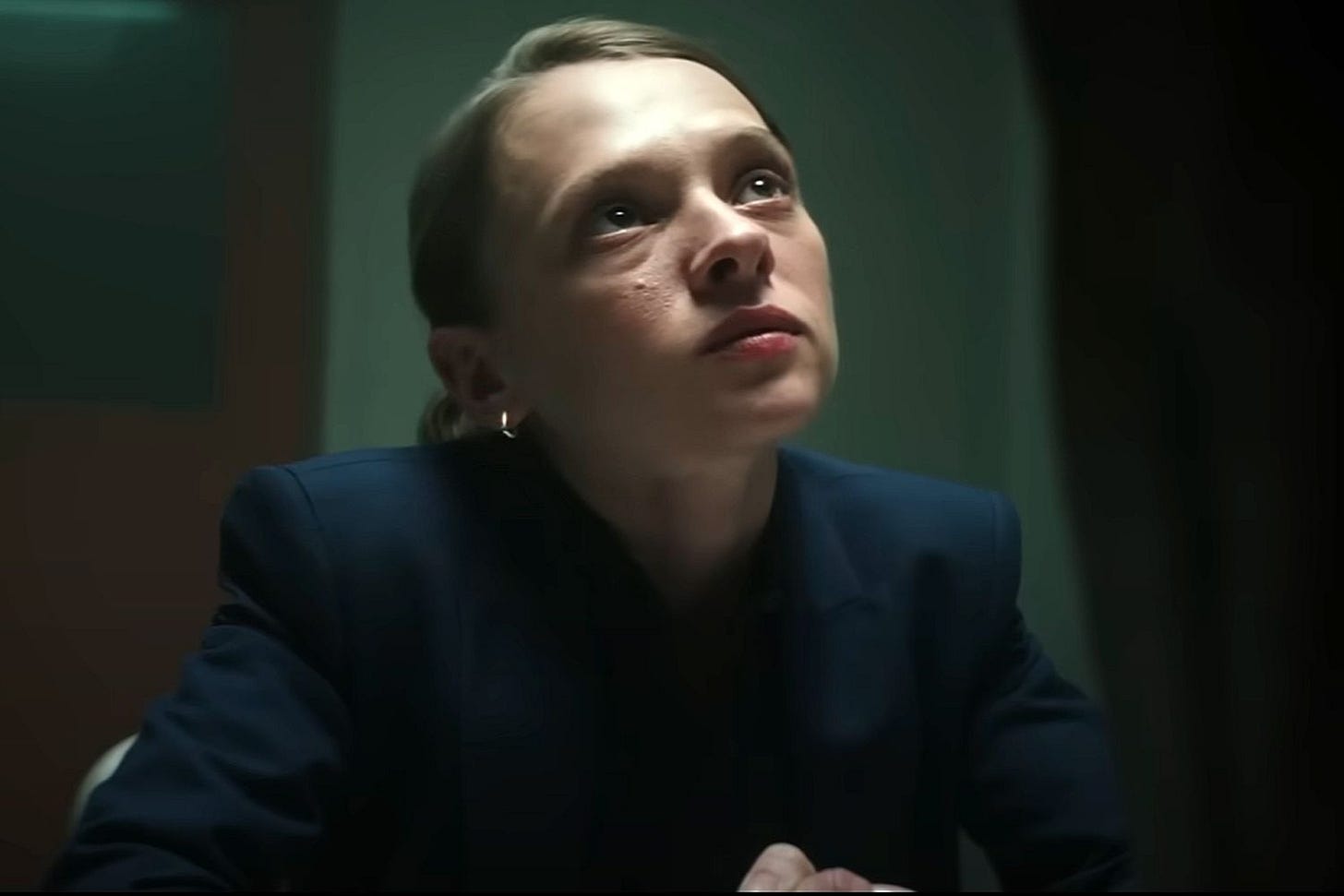
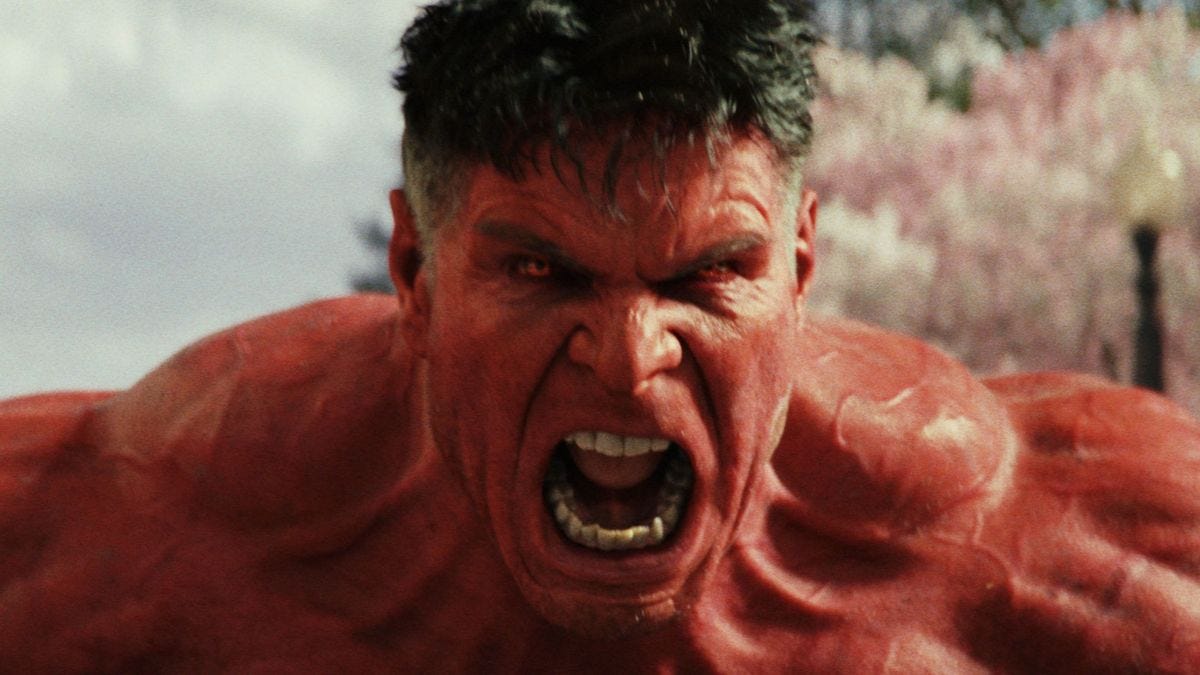
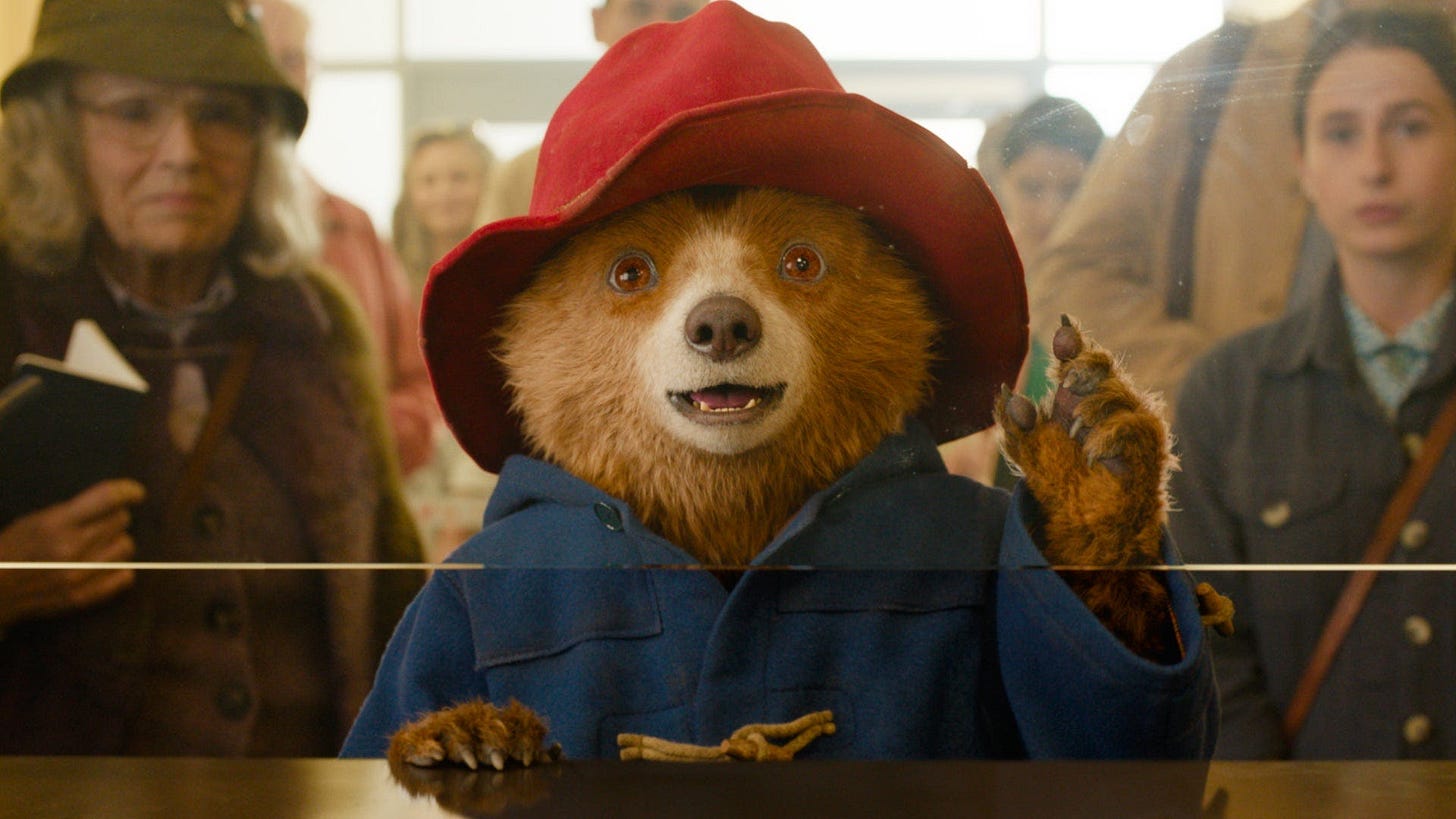
Great article! I've seen a fair number of Marvel movies but none of the Paddingtons.
In your opinion, are they as good as rumored? Are they better than average?
One day, a villain in the MCU will get Adamantium fillings and develop a smile impervious to all punches, even the Hulk's!
Wow. Between this and your note about baseball movies (https://substack.com/@fromtheyardtothearthouse/note/c-93810938 ) I am impressed by your combination of nerdy cultural knowledge and the ability to marshal it to make a broader point.
Also I love this phrase, "Ross ends up involving America in an international mishigoss involving adamantium"